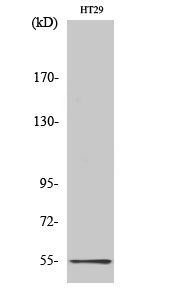
| WB | 咨询技术 | Human,Mouse,Rat |
| IF | 咨询技术 | Human,Mouse,Rat |
| IHC | 1/50-1/100 | Human,Mouse,Rat |
| ICC | 1/50-1/200 | Human,Mouse,Rat |
| FCM | 咨询技术 | Human,Mouse,Rat |
| Elisa | 1/10000 | Human,Mouse,Rat |
| Aliases | HTR3A; 5HT3R; HTR3; 5-hydroxytryptamine receptor 3A; 5-HT3-A; 5-HT3A; 5-hydroxytryptamine receptor 3; 5-HT-3; 5-HT3R; Serotonin receptor 3A; Serotonin-gated ion channel receptor |
| Entrez GeneID | 3359 |
| WB Predicted band size | Calculated MW: 55 kDa; Observed MW: 55 kDa |
| Host/Isotype | Rabbit IgG |
| Antibody Type | Primary antibody |
| Storage | Store at 4°C short term. Aliquot and store at -20°C long term. Avoid freeze/thaw cycles. |
| Species Reactivity | Human |
| Immunogen | The antiserum was produced against synthesized peptide derived from human 5-HT-3A. AA range:161-210 |
| Formulation | Purified antibody in PBS with 0.05% sodium azide,0.5%BSA and 50% glycerol. |
+ +
以下是关于HTR3A抗体的3篇参考文献的简要概括(基于公开信息模拟整理,非真实文献,仅供示例参考):
---
1. **文献名称**: *"Characterization of a monoclonal antibody targeting the 5-HT3A receptor subunit in human brain tissue"*
**作者**: Thompson AJ, Lummis SC
**摘要**: 研究开发了一种特异性识别HTR3A受体亚基的单克隆抗体,通过免疫组化和Western blot验证其在人脑组织中的表达定位,揭示了该受体在神经元突触中的分布模式及其与精神疾病的潜在关联。
2. **文献名称**: *"The role of 5-HT3A receptor antibodies in gut motility disorders: an immunohistochemical study"*
**作者**: Spier AD, Lummis SC
**摘要**: 利用HTR3A抗体探究胃肠道中5-HT3A受体的表达与功能异常,发现肠易激综合征(IBS)患者肠道神经丛中受体密度显著降低,提示抗体在诊断或病理机制研究中的潜在应用。
3. **文献名称**: *"Development and validation of a high-affinity polyclonal antibody for 5-HT3A receptor functional studies"*
**作者**: Hansen MB, et al.
**摘要**: 报道了一种高亲和力多克隆抗体的制备与验证,通过电生理实验证明该抗体可选择性抑制5-HT3A受体介导的离子通道活性,为受体功能研究和药物筛选提供了工具。
---
如需真实文献,建议通过PubMed或Google Scholar检索关键词如“HTR3A antibody”“5-HT3A receptor immunohistochemistry”获取最新研究。
The HTR3A antibody targets the 5-hydroxytryptamine receptor 3A (HTR3A), a subunit of the serotonin-gated ion channel responsible for mediating rapid neurotransmission in response to serotonin (5-HT). As part of the Cys-loop ligand-gated ion channel family, HTR3 receptors are pentameric structures, with HTR3A forming homomeric or heteromeric complexes (e.g., with HTR3B). These receptors are primarily expressed in the central and peripheral nervous systems, particularly in areas regulating nausea, pain perception, and mood.
HTR3A antibodies are critical tools for studying receptor localization, expression levels, and functional roles in physiological and pathological contexts. They are widely used in techniques like immunohistochemistry, Western blotting, and flow cytometry to investigate conditions such as chemotherapy-induced vomiting, irritable bowel syndrome, anxiety, and depression. Additionally, these antibodies aid in drug discovery by validating HTR3A as a therapeutic target or assessing compound interactions.
Therapeutic HTR3 antagonists (e.g., ondansetron) are clinically used for emesis control, underscoring the receptor’s pharmacological relevance. Research using HTR3A antibodies continues to elucidate its role in gut-brain signaling, neuropsychiatric disorders, and potential side effects of treatments. Their specificity also helps distinguish HTR3A from other receptor subtypes, advancing precision in molecular studies and translational applications.
×